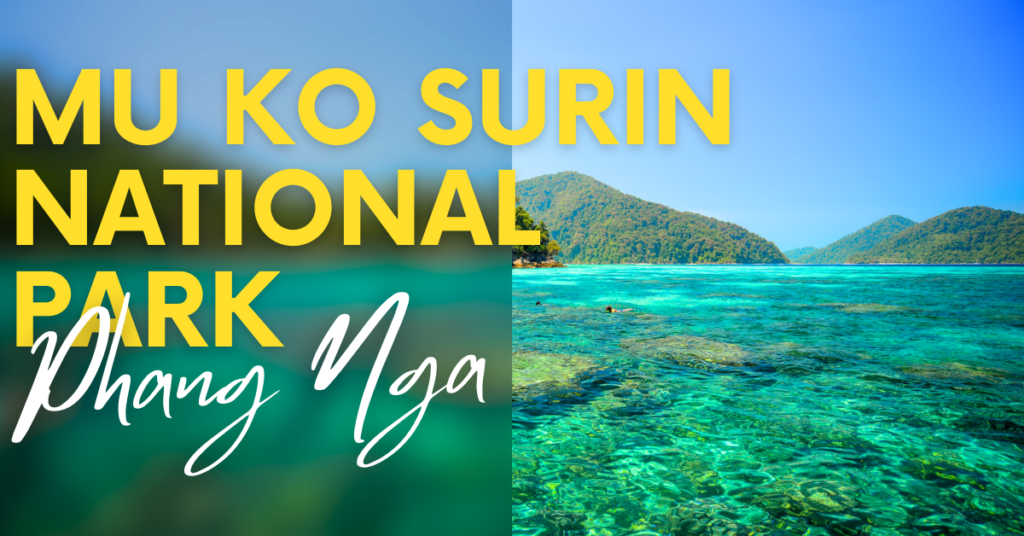Transportation
Reaching Mu Ko Surin National Park Phang Nga primarily involves traveling to Kuraburi Pier in Phang Nga province. From major cities such as Bangkok or Phuket, visitors can take a bus or car to Kuraburi. The journey by road from Phuket to Kuraburi Pier takes approximately three hours. For those preferring air travel, flights to Phuket International Airport followed by a transfer to Kuraburi are also viable options.
Once at Kuraburi Pier, the most common means of transport to the islands is by boat. Speedboats offer the fastest journey, taking about an hour to reach the park. Alternatively, larger and slower boats provide a more relaxed trip, taking around two to three hours. These boats are usually scheduled to align with the peak visiting times and can be booked through various tour operators.
Within the national park, longtail boats are the primary mode of transport between the islands. These traditional boats are available for hire and offer a scenic and cultural way to explore the archipelago. Guided tours often include transportation, making it convenient for visitors to experience multiple islands in a single trip.
Attractions and Activities
Mu Ko Surin National Park is renowned for its pristine coral reefs, making it a premier destination for snorkeling and diving. The clear waters and abundant marine life provide an exceptional underwater experience. Sites such as Ao Mae Yai Bay and Ao Luek are popular snorkeling spots, offering vibrant coral gardens and a variety of fish species.
Apart from marine activities, the park features lush tropical forests and scenic trails for hiking enthusiasts. Trails such as the Ao Chong Khad trail offer stunning views of the coastline and an opportunity to observe local wildlife. Birdwatching is another popular activity, with species such as the Nicobar pigeon and white-bellied sea eagle commonly sighted.
Cultural experiences are also a highlight, particularly visits to the villages of the Moken, a nomadic sea-faring community. The Moken people’s unique way of life, traditional boats, and handicrafts provide visitors with an insight into their rich cultural heritage. Interacting with the Moken and learning about their sustainable living practices is a unique aspect of visiting Mu Ko Surin National Park Phang Nga.

Accommodation
Accommodation within Mu Ko Surin National Park ranges from basic camping facilities to more comfortable bungalows. The park’s main accommodation areas are located on the two main islands, Surin Nuea and Surin Tai. Camping is a popular option, with well-maintained campsites available for those who enjoy a closer connection to nature. Tents and essential camping gear can be rented from the park office.
For those preferring more comfort, bungalows offer a pleasant stay with basic amenities. These bungalows, managed by the park authorities, provide a simple but comfortable option, typically featuring beds, electricity, and private bathrooms. Booking in advance is recommended, especially during the peak tourist season from November to April.
Outside the park, in Kuraburi, several hotels and guesthouses cater to visitors. These range from budget accommodations to more upscale resorts. Staying in Kuraburi offers the convenience of a shorter travel distance to the pier and a broader selection of dining and leisure options, allowing visitors to explore the local area before or after their trip to the islands.
Conservation and Environment
Mu Ko Surin National Park Phang Nga is a vital conservation area dedicated to preserving its rich marine and terrestrial biodiversity. The park’s coral reefs are among the most well-preserved in Thailand, hosting a variety of marine species, including endangered species like the green sea turtle and the whale shark. Conservation efforts focus on protecting these delicate ecosystems from the impacts of tourism and climate change.
The park authorities implement strict regulations to minimize human impact on the environment. This includes limiting the number of visitors, enforcing no-fishing zones, and promoting sustainable tourism practices. Visitors are encouraged to follow guidelines such as not touching the coral, avoiding the use of harmful sunscreens, and properly disposing of waste to protect the natural habitat.
Community involvement is a key aspect of the park’s conservation strategy. Local communities, particularly the Moken, play an essential role in conservation activities. Their traditional knowledge and sustainable practices are integrated into the park’s management, ensuring that both cultural heritage and natural resources are preserved for future generations.

Facilities
Mu Ko Surin National Park offers a range of facilities to ensure a comfortable and enjoyable visit. The visitor center, located on Surin Nuea Island, provides essential information about the park, including maps, brochures, and educational exhibits. This center serves as a starting point for exploring the park and understanding its ecological and cultural significance.
Basic amenities such as restrooms and showers are available at the main camping and bungalow areas. These facilities are maintained regularly to ensure cleanliness and convenience for visitors. Additionally, small shops and food stalls offer snacks, beverages, and basic supplies, catering to the needs of campers and day-trippers alike.
For medical emergencies, a small clinic is available on Surin Nuea Island, staffed with medical personnel trained to handle minor injuries and illnesses. This ensures that visitors have access to necessary medical care during their stay. Furthermore, ranger stations are strategically located around the park, providing safety information and assistance to visitors.
Precautions and Recommendations
Visitors to Mu Ko Surin National Park are advised to take several precautions to ensure their safety and the protection of the environment. Firstly, it is essential to respect the park’s guidelines and regulations, including those related to wildlife interaction and waste disposal. Following these rules helps preserve the park’s pristine condition and ensures a safe experience for everyone.
Weather conditions can change rapidly, so it is advisable to check forecasts and be prepared for sudden changes, particularly during the monsoon season. Bringing appropriate gear such as rain jackets, sturdy footwear, and sufficient water is recommended for hiking and other outdoor activities. Additionally, using reef-safe sunscreen protects the marine environment from harmful chemicals.
Health precautions include being mindful of dehydration and sun exposure. Wearing protective clothing, hats, and sunglasses, along with regular hydration, helps prevent heat-related issues. Visitors should also be aware of jellyfish and other marine hazards, ensuring they follow safety instructions provided by park authorities and tour guides.

Advantages
Mu Ko Surin National Park offers numerous advantages for nature enthusiasts and adventure seekers. Its pristine environment and rich biodiversity provide a unique opportunity to experience Thailand’s natural beauty. The park’s well-preserved coral reefs and diverse marine life make it a top destination for snorkeling and diving, offering underwater adventures that are both thrilling and educational.
The park’s commitment to sustainable tourism ensures that visitors can enjoy its natural wonders while contributing to conservation efforts. By adhering to eco-friendly practices and supporting local communities, tourists play a vital role in preserving the park’s ecosystems. This approach not only benefits the environment but also enhances the visitor experience by maintaining the park’s pristine condition.
Cultural interactions, particularly with the Moken community, add a valuable dimension to the visit. Learning about their traditional way of life and participating in cultural activities enriches the travel experience, fostering a deeper appreciation for the region’s heritage. This blend of natural and cultural attractions makes Mu Ko Surin National Park a well-rounded and enriching destination.
Economic Significance
Mu Ko Surin National Park significantly contributes to the local and national economy through tourism revenue. The influx of tourists creates jobs and supports businesses in and around the park, including hotels, restaurants, and tour operators. This economic activity provides a stable income for local communities, promoting regional development and improving living standards.
The park’s sustainable tourism model emphasizes the importance of balancing economic benefits with environmental preservation. By limiting the number of visitors and promoting eco-friendly practices, the park ensures that tourism remains a viable long-term source of income. This approach helps protect natural resources while maintaining a steady flow of revenue.
In addition to direct economic benefits, the park’s conservation efforts attract funding and support from international organizations and environmental groups. These contributions aid in furthering research, conservation projects, and infrastructure development, ensuring that the park remains a model for sustainable tourism and environmental stewardship in Thailand.


